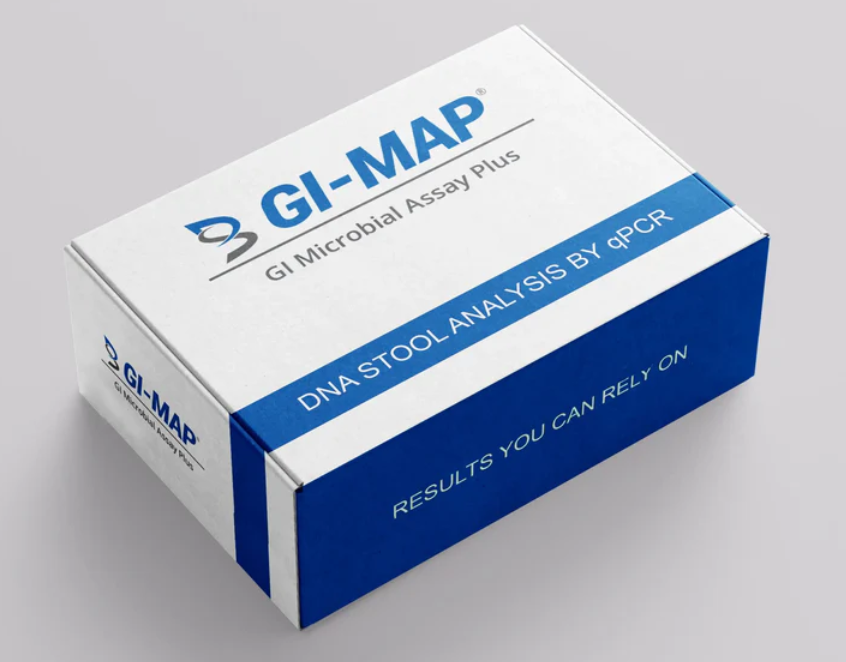It’s completely natural to want answers when you are trying to manage your autoimmune condition(s). Especially when your symptoms flare up unpredictably. You want to know why these flare-ups are happening in the first place. One of the most common approaches people take is food sensitivity testing, hoping to identify the “culprit” foods that are causing inflammation. However, this approach may not address the root causes of your symptoms.
In reality, food sensitivities are often symptoms of a deeper issue—one that starts in the gut. This is why GI-MAP testing should be your first step rather than jumping straight to food sensitivity tests.
The Role of Gut Health in Autoimmune Conditions
Autoimmune conditions are closely tied to gut health. A key factor in autoimmune flare-ups is leaky gut syndrome, also known as increaseed intestinal permeability.
The gut lining serves as a barrier, allowing nutrients to pass into the bloodstream while keeping harmful substances, such as undigested food particles, toxins, and pathogens, out. In cases of leaky gut, this barrier becomes compromised, and harmful substances can pass through into the bloodstream. The result? Inflammation and an overactive immune response.
When the immune system detects these foreign particles in the bloodstream, it sees them as threats and begins to attack. Over time, this immune response can lead to food sensitivities and contribute to the worsening of autoimmune conditions.
What Causes Leaky Gut?
Multiple factors can contribute to leaky gut, including:
- Chronic stress
- Poor diet (especially one high in processed foods, sugar, and inflammatory fats)
- Gut infections (bacterial overgrowth, parasites, etc.)
- Toxin exposure
- Use of certain medications (like NSAIDs or antibiotics)

When leaky gut is present, the body reacts by creating antibodies against the foreign particles that escape into the bloodstream, leading to food sensitivities. Therefore, testing for food sensitivities without addressing the root cause of leaky gut will not provide a long-term solution. The root issue—the gut lining—needs to be repaired first.
Why GI-MAP Testing is the First Step
GI-MAP (Gastrointestinal Microbial Assay Plus) is a comprehensive stool analysis that provides a clear picture of your gut health. This test identifies imbalances in the gut microbiome, the presence of pathogens (bacteria, parasites, viruses, and fungi), digestive enzyme activity, and markers of inflammation. The GI-MAP is especially valuable for women with autoimmune conditions because it helps to pinpoint the exact issues contributing to leaky gut.

Here’s what GI-MAP testing looks for:
- Microbiome Health: GI-MAP assesses the balance of beneficial bacteria and detects overgrowth of harmful microbes, which can contribute to intestinal permeability.
- Pathogens & Parasites: It identifies the presence of harmful bacteria, parasites, and viruses that can trigger inflammation and further damage the gut lining.
- Markers of Gut Function: It measures markers such as calprotectin, which indicates inflammation, and zonulin, a protein that regulates the tight junctions of the gut lining. High zonulin levels are often a marker of leaky gut.
- Immune Response: The test also checks for secretory IgA, an important antibody that plays a crucial role in gut immune health.
By getting a detailed picture of the gut’s ecosystem, the GI-MAP can help pinpoint the underlying causes of gut dysfunction, which, if left unaddressed, can continue to fuel your autoimmune symptoms.
The Importance of AIP Elimination and Reintroduction Diet with GI-MAP Testing
The Autoimmune Protocol (AIP) elimination and reintroduction diet is also a powerful tool in addressing food sensitivities and reducing inflammation, particularly in women with autoimmune conditions.
Step 1: Elimination Phase During the elimination phase of AIP, foods that are common triggers for inflammation and immune responses (such as grains, dairy, nightshades, and processed foods) are removed from the diet. This phase allows your gut to rest and reduces systemic inflammation.
Step 2: Reintroduction Phase Once the gut has had time to heal, foods are systematically reintroduced, one at a time, while monitoring for any reactions. This helps identify specific triggers without the confusion that often comes with food sensitivity testing.
When combined with the insights from GI-MAP testing, the AIP approach can help repair the gut lining, balance the gut microbiome, and ultimately identify and reduce food sensitivities. By targeting the root cause of the sensitivities (gut dysfunction and leaky gut), you can experience long-term relief from autoimmune symptoms rather than temporary fixes.
Supporting Evidence: GI-MAP Testing and Autoimmune Disease
In case you are like me and enjoy diving into, here are three scientific studies that have highlighted the connection between gut health and autoimmune conditions:
- Leaky Gut and Autoimmune Disease: A study published in Frontiers in Immunology highlights that increased intestinal permeability plays a significant role in autoimmune diseases, as it allows for the translocation of foreign antigens that can activate the immune system.
- Microbiome Imbalances: Research from Nature Reviews Immunology shows that disruptions in the gut microbiome are closely linked to autoimmune diseases such as rheumatoid arthritis and lupus.
- Diet and Gut Health: The Journal of Clinical Gastroenterology reported that dietary interventions, such as elimination diets, can positively influence gut health, reduce inflammation, and help manage autoimmune symptoms.
These studies reinforce the importance of addressing your gut health so that you are able manage autoimmune condition effectively. GI-MAP testing provides a foundation for understanding the root causes of gut dysfunction, while the AIP diet offers a practical, structured approach to healing.
Incorporating GI-MAP Testing and the AIP Diet in Autoimmune Harmony™

Autoimmune Harmony™ is my comprehensive 6-month program designed for women with autoimmune conditions who are ready to take control of their health and significantly reduce flare-ups. Using a functional medicine approach, we start with advanced GI-MAP testing to uncover the root causes of your symptoms by diving deep into your gut health.
As part of the program, I also review your lab work results to ensure we have a complete understanding of your unique health picture. These insights are then integrated into your fully customized wellness plan. This plan includes strategic supplementation, the AIP elimination and reintroduction diet, and tailored lifestyle changes that work together to reduce your inflammation and promote healing.
With expert one-on-one guidance throughout the entire process, I provide you with the support and clarity you need to feel confident and empowered. You’ll also receive custom meal collections and all the resources necessary for success—not just during the program, but for life.
Together, we’ll address the root causes of your autoimmune symptoms and create sustainable, long-term strategies so you can manage your health confidently and live your life fully.
A Path to Lasting Healing
If you have one or more autoimmune conditions, don’t let temporary solutions like food sensitivity tests distract you from addressing the root cause of your symptoms. By starting with GI-MAP testing and the AIP diet, you’ll be taking the first step toward long-term healing rather than short-term symptom relief. This integrative, personalized approach can help you break free from the cycle of flare-ups and uncertainty.
Ready to take control of your autoimmune symptoms and start living the life you deserve? I invite you to schedule an Autoimmune Insight Session today. Let’s explore how GI-MAP testing, the AIP diet, and a tailored wellness plan can help you reclaim your health and thrive.
Don’t wait—start your journey to healing now, and let’s work together toward a healthier, happier you.
References:
- Frontiers in Immunology: Intestinal Permeability in Autoimmune Diseases. DOI: 10.3389/fimmu.2017.00552
- Nature Reviews Immunology: The Role of the Gut Microbiome in Autoimmune Diseases. DOI: 10.1038/nri.2018.15
- Journal of Clinical Gastroenterology: Impact of Dietary Interventions on Gut Health and Autoimmune Disease. DOI: 10.1097/MCG.0000000000001006


Leave a Reply